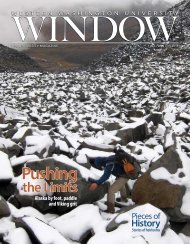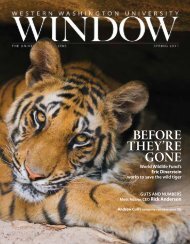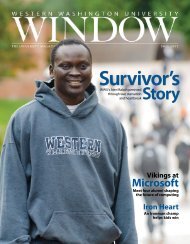WINDOW
Porch light groupies - WINDOW - The magazine for WWU
Porch light groupies - WINDOW - The magazine for WWU
- No tags were found...
You also want an ePaper? Increase the reach of your titles
YUMPU automatically turns print PDFs into web optimized ePapers that Google loves.
WWU Linguist Edward Vajda has worked closely<br />
with Ket speakers in Siberia, including Ulka, who<br />
is one of the last remaining fluent speakers of the<br />
language.<br />
Photo by Edward Vajda<br />
LINKED<br />
THROUGH LANGUAGE<br />
Linguistics Professor<br />
Edward Vajda finds<br />
clues to ancient North<br />
American migrations in a<br />
tiny Siberian village<br />
By Matthew Anderson (’06)<br />
There are no roads. There is no train. Most of this<br />
area, a gorgeous land of forests, streams and lakes<br />
beside the broad Yenisei River, is as undeveloped as it<br />
was the day 400 years ago when Russian fur trappers<br />
first documented this land.<br />
There is no oil here deep in the north of Siberian<br />
Asia. No natural gas. No gold.<br />
But for those interested in the spread of civilization<br />
throughout Asia and into North America, there<br />
is something here of indescribable value.<br />
Ket, a language spoken by fewer than 50 people,<br />
could hold the key to understanding the origin of<br />
many Native Americans.<br />
Clues to a shared ancestry<br />
Kellog Village comprises a handful of Russian-style<br />
cabins huddled hard against the Yelogui River, one<br />
of the Yenisei’s largest tributaries. Most of the 342<br />
people who live here have never seen civilization any<br />
bigger than this. The only way in is by helicopter<br />
or, during the couple months of Siberian summer,<br />
steamboat.<br />
And yet, right now in North America are thousands<br />
of people who share ancestry with the people<br />
living along this river. They trolled it for fish and<br />
floated to its center to avoid the swarms of mosquitos<br />
clustered along its shore. They revered the spirit of the<br />
sky but reviled his earthly wife, who they believe caused<br />
sickness and misfortune among the people. They traded<br />
squirrel pelts and used decomposed fish oil as poison<br />
with which they’d daub their wooden arrows.<br />
Continued on page 16<br />
One language disappears<br />
every two weeks. But the loss<br />
of Ket is more than the loss<br />
of just another language.<br />
14 www.wwu.edu/window 15








